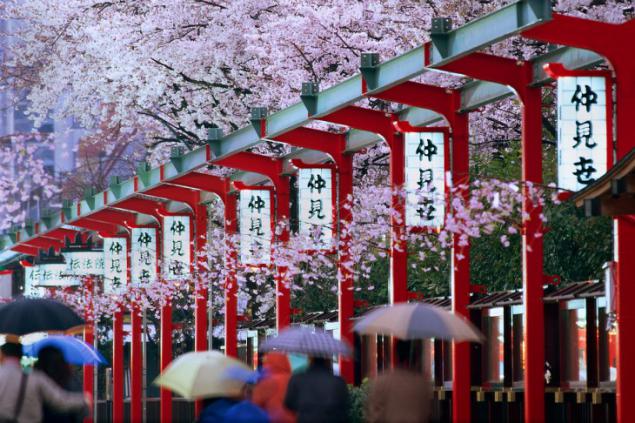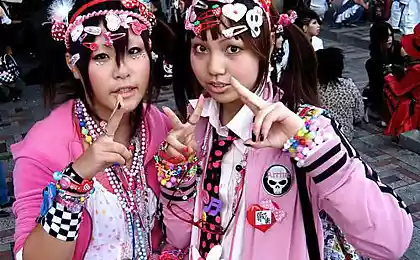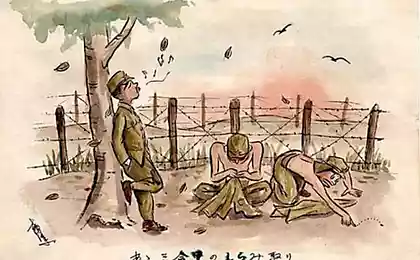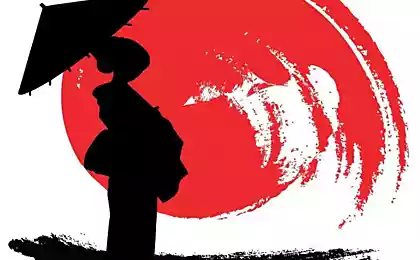706
"Live as if you were already dead": 7 Principles of Japanese life
The site publishes an article by anthropologist Ruth Benedict - of self-discipline in Japanese, and how it helps to cope with life's difficulties - from examinations to depression. < 1. Little baby is born happy, but not "taste of life». It is only through spiritual training (or self-discipline - syuye) man and woman are able to live fully and to "feel the taste" of life. The only way to love life.
2. "Skillful" discipline in Japan is the rationale: it improves human control over their own lives. Any weakness, he will feel like a beginner, surmountable, they say, because in the end he or start receiving from learning fun, or surrender. Apprentice properly masters of their profession, the boy develops judo young wife adjusts to the requirements of the in-law.
It is clear that in the early stages of preparation of a man and woman who are not used to the new requirements, may want to get rid of this syuye. In this case, their fathers are likely to say to them: "What do you want? In order to get a taste of life, you must go through some training. If you surrender and are not going to train themselves, the result will certainly find yourself miserable ... »
Syuye, according to their favorite adage, "cleanses the body from rust." Man turns into a glittering sharp sword, which he, of course, would like to become.
3. The nature of this state of the art (muga) that ... «there is no break, even in thick hair, between the will of man and his action»
In people who have not reached mastery, there is, so to speak, the insulating screen that is between the will and action. It is called "watching" I, "" interfering "I", and when the screen is eliminated special training, the master loses the feeling of "I do." The goal is closed on itself. The action takes place without effort ... perfectly reproduces the painting, which drew in the mind of a performer. This kind of craftsmanship in Japan are making ordinary people.

4. Human childhood is highly trained to recognize their own actions and judge them in the light of what people will say; his "I-observer" extremely vulnerable. To surrender to the delight of his soul, he removes this vulnerability "I". He ceases to feel that "he does", and then begins to feel in his heart his true ability in the same way as an apprentice in the art of fencing feels the ability to stand on four-foot pole without fear of falling.
5. The most extreme, at least to Western ears, the form in which the Japanese express this idea - essentially approving attitude to the man, «who lives as if already dead"
The Japanese say: "Live as if dead" when they mean that man lives at the level of "skill". This expression is used in normal everyday instruction. To cheer up the boy who is going through a relatively final exams in high school, he will say: "Treat him as a man who was already dead, and you hand over easily." To appease the other, which concludes an important business deal, say: "Be like you're already dead».
6. Moog is based on the same philosophy as the Council live "as if you were dead». In this state, a person has no apprehension of self and, therefore, all the fear and prudence. In other words: "My energy and attention seamlessly routed directly to the implementation of the goals. "There is the" I "with all its load of fear is no longer between me and the goal. With him gone tightness and tension, a tendency to depression, which bothered me in the previous search. Now, for me, everything was possible ".
7. In Western philosophy, practicing muga and "life as if you were dead", Japanese eliminate conscience. What they call "watching me" or "I'm interfering," serves as a censor, judging human actions.
The difference between the Western and Eastern psychology is clearly manifested in the fact that, when we talk about unscrupulous Americans, we are referring to a person who has lost the sense of sin, which must be accompanied offense, but when the equivalent expression uses Japanese, he is referring to a person who ceases be tense and constrained.
The Japanese have in mind the person to whom the power of the most difficult and decisive selfless action. The main motivation of good conduct for the American - this wine; a person who because of rough conscience ceases to feel it, it is anti-social. The Japanese are a problem otherwise. According to their philosophy, a man in the depths of the soul good. If his motivation can be directly implemented into action, he entered a chaste and easily ».
via www.psychologies.ru/psychotherapy/self-development/jivi-budto-tyi-uje-umer/
2. "Skillful" discipline in Japan is the rationale: it improves human control over their own lives. Any weakness, he will feel like a beginner, surmountable, they say, because in the end he or start receiving from learning fun, or surrender. Apprentice properly masters of their profession, the boy develops judo young wife adjusts to the requirements of the in-law.
It is clear that in the early stages of preparation of a man and woman who are not used to the new requirements, may want to get rid of this syuye. In this case, their fathers are likely to say to them: "What do you want? In order to get a taste of life, you must go through some training. If you surrender and are not going to train themselves, the result will certainly find yourself miserable ... »
Syuye, according to their favorite adage, "cleanses the body from rust." Man turns into a glittering sharp sword, which he, of course, would like to become.
3. The nature of this state of the art (muga) that ... «there is no break, even in thick hair, between the will of man and his action»
In people who have not reached mastery, there is, so to speak, the insulating screen that is between the will and action. It is called "watching" I, "" interfering "I", and when the screen is eliminated special training, the master loses the feeling of "I do." The goal is closed on itself. The action takes place without effort ... perfectly reproduces the painting, which drew in the mind of a performer. This kind of craftsmanship in Japan are making ordinary people.

4. Human childhood is highly trained to recognize their own actions and judge them in the light of what people will say; his "I-observer" extremely vulnerable. To surrender to the delight of his soul, he removes this vulnerability "I". He ceases to feel that "he does", and then begins to feel in his heart his true ability in the same way as an apprentice in the art of fencing feels the ability to stand on four-foot pole without fear of falling.
5. The most extreme, at least to Western ears, the form in which the Japanese express this idea - essentially approving attitude to the man, «who lives as if already dead"
The Japanese say: "Live as if dead" when they mean that man lives at the level of "skill". This expression is used in normal everyday instruction. To cheer up the boy who is going through a relatively final exams in high school, he will say: "Treat him as a man who was already dead, and you hand over easily." To appease the other, which concludes an important business deal, say: "Be like you're already dead».
6. Moog is based on the same philosophy as the Council live "as if you were dead». In this state, a person has no apprehension of self and, therefore, all the fear and prudence. In other words: "My energy and attention seamlessly routed directly to the implementation of the goals. "There is the" I "with all its load of fear is no longer between me and the goal. With him gone tightness and tension, a tendency to depression, which bothered me in the previous search. Now, for me, everything was possible ".
7. In Western philosophy, practicing muga and "life as if you were dead", Japanese eliminate conscience. What they call "watching me" or "I'm interfering," serves as a censor, judging human actions.
The difference between the Western and Eastern psychology is clearly manifested in the fact that, when we talk about unscrupulous Americans, we are referring to a person who has lost the sense of sin, which must be accompanied offense, but when the equivalent expression uses Japanese, he is referring to a person who ceases be tense and constrained.
The Japanese have in mind the person to whom the power of the most difficult and decisive selfless action. The main motivation of good conduct for the American - this wine; a person who because of rough conscience ceases to feel it, it is anti-social. The Japanese are a problem otherwise. According to their philosophy, a man in the depths of the soul good. If his motivation can be directly implemented into action, he entered a chaste and easily ».
via www.psychologies.ru/psychotherapy/self-development/jivi-budto-tyi-uje-umer/
10 interesting facts about friendship from which warms the soul
What foods cause a very strong dependence























